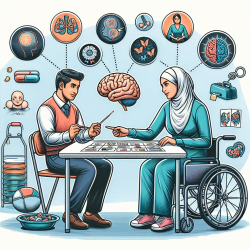Introduction
In the realm of speech-language pathology, making informed decisions is crucial for practitioners striving to create optimal outcomes for children. The same principle applies to organ donation campaigns, as highlighted in the research article titled "Campaigning for Organ Donation at Mosques." This blog post aims to explore how practitioners can enhance their skills by understanding the ethical considerations and data-driven insights presented in the study, ultimately encouraging further research and informed decision-making.
The Importance of Comprehensive Information
The research underscores the significance of providing complete and accurate information in organ donation campaigns. In the context of mosques, faith leaders are often recruited to overcome religious barriers and promote donor registration among Muslims. However, the study reveals that the information shared is often limited to encouraging donor registration, neglecting the disclosure of potential risks and controversies associated with organ donation.
For practitioners in the field of speech-language pathology, this serves as a reminder of the importance of transparency and honesty when communicating with clients and their families. Just as faith leaders should provide comprehensive information about organ donation, practitioners must ensure that parents and caregivers are fully informed about the potential benefits and challenges of therapy interventions.
Data-Driven Decision Making
The research article emphasizes the need for data-driven decision-making in organ donation campaigns. It highlights the persistent medical, ethical, and legal challenges that hinder the global acceptance of organ donation. By understanding these challenges, practitioners can apply a similar approach to their practice, utilizing empirical evidence and data to guide their decisions.
In speech-language pathology, data-driven decision-making involves collecting and analyzing data on a child's progress, treatment efficacy, and potential risks. By leveraging this information, practitioners can tailor interventions to meet the unique needs of each child, ensuring the best possible outcomes.
Encouraging Further Research
The research article also encourages further exploration into the ethical implications of organ donation campaigns. Practitioners can take inspiration from this call to action by engaging in continuous professional development and staying updated on the latest research in their field.
By conducting their own research or collaborating with colleagues, practitioners can contribute to the body of knowledge in speech-language pathology, ultimately improving the quality of care provided to children. This commitment to ongoing learning aligns with the ethical responsibility to provide evidence-based interventions and uphold the highest standards of practice.
Conclusion
In conclusion, the research article "Campaigning for Organ Donation at Mosques" serves as a valuable resource for practitioners seeking to enhance their skills and make informed decisions. By prioritizing comprehensive information, data-driven decision-making, and continuous research, practitioners can create positive outcomes for children in their care.
To read the original research paper, please follow this link: Campaigning for Organ Donation at Mosques.










